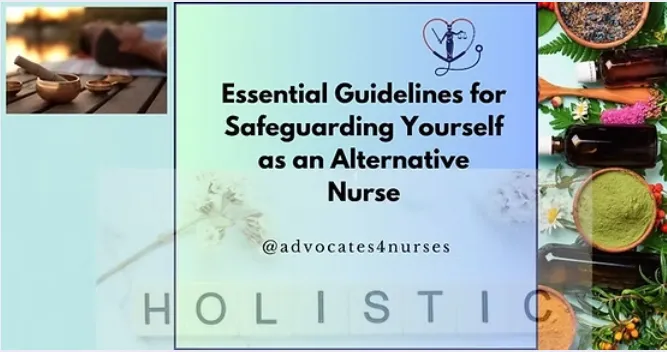
Protect Yourself as an Alternative Nurse: Essential Guidelines
I am so honored to have had the opportunity to #speak at the Austin Area Chapter of the American Holistic Nurses Association Meeting where I was asked to discuss how #Holistic #Nurses can Protect themselves and provided then with some essential guidelines, and I will share a few with you.
As #holisticnurses, #nursehealthcoaches, and #alternativepractitioners, it's crucial to understand and respect the boundaries of your specific practice. I have unfortunately in the last 6 months heard from #RNs reported to boards of nursing when practicing outside their scope allegedly while working in the role of an alternative nurse.
So , I want to take some time go go over some key points that I shared with them here with my LI family as well to help you protect your license and stay in your lane.
1. Understand Your Scope of Practice
Adhere to the standards set by nursing board the patient and or client resides. Stay within scope for RNs, #NPs, #LPNs, and health coaches.
Example: As a nurse with an advanced degree in leadership, I provide educational tools but do not diagnose or treat conditions. Always refer clients to medical doctors for such needs. Many nurses face discipline for practicing alternative medicine beyond their scope, especially when regulations are unclear and as one of the hosts states last night, it roughly takes about a decade for rules and regs to mirror the actual change.
2. Use Titles Appropriately
Clarify the legal and professional responsibilities with titles like RN and NP.
Example: If you use both "nurse" and "coach" titles, you're held to the highest level of your education, e.g., NP rules apply even if you are working as an RN.
Always wear a badge and clarify your title and education level. If you are a nurse and you write DR. before your name go ahead and follow that up with DNP ect... If you do one you do the other! Misrepresentation can lead to disciplinary actions, I've seen it! Be clear about your credentials and titles on social media and websites as well. No stone will be left unturned if you are reported for misrepresenting yourself.
3. Obtain Informed Consent
Essential for alternative or holistic therapies. Maintain thorough documentation.
Example: LIPs (NPs, PAs, MDs) must provide informed consent, especially when deviating from standard medical care. RNs do not provide informed consent.
Ensure all education and advice given is documented. "If it’s not documented, it’s not done." RN's, LPN's don't diagnose, write medical treatment plans, order and or recommend labs and or medication changes ect. STAY IN YOUR LANE!
4. Have a Solid Contract
Before you open your doors, hire a lawyer and create a solid contract that clearly states in the contract agreement between you and the client that you are not providing medical diagnoses or treatments as an RN and or if practicing as a coach.
Example: Include disclaimers of liability and arbitration clauses to handle disputes out of court. Specify that nutritional advice is based on general wellness, not medical treatment and be sure to define the scope of services to limit liability and ensure clients understand what to expect.
5. Integrate Evidence-Based Practice
Use evidence-based practices in holistic and alternative therapies to ensure safe and effective patient care and take into consideration current medications and treatment plans.
Example: Incorporate studies and guidelines when recommending supplements or holistic treatments, ensuring they are backed by research and ok with their managing provider if you have identified they are currently taking prescribed medications and under the treatment of a medical doctor.
6. Collaborate with Other Healthcare Professionals
Even if in your state as a NP you have full practice authority why not consult with an MD and or have a relationship with an MD if you have any questions and or concerns.
Example: Even in full practice authority states, consider having an LIP backup for complex cases, showing prudency and compliance.
7. Regulations - Stay up to date
Ongoing education is crucial in nursing and holistic practices to stay current and ensure that you are aligning with best practices as well as the rules and regulations that dictate your professional license.
Example: Post-pandemic, ensure adherence to updated telehealth and cross-state practice regulations and meet all CE requirements for both nursing and coaching credentials.
8. Practice Ethically
Respect patient autonomy, avoid guaranteeing outcomes, and ensure treatments are safe and appropriate.
Example: As a holistic nurse or health coach, avoid making unfounded claims about treatment effectiveness and ensure all advice is ethically sound.
Do not treat family or friends unless it's a medical emergency to avoid boundary issues.
9. GET PROFESSIONAL LIABILITY INSURANCE!!!
Understand your scope, use titles appropriately, obtain informed consent, have solid contracts, use evidence-based practices, collaborate, pursue continuous education, practice ethically, and ensure safe practice. Empower yourself with knowledge and stay within your professional boundaries to protect your license and practice safely. By following these guidelines, you can confidently navigate the complexities of holistic nursing and health coaching while protecting your professional integrity and license.
Remember, staying informed and compliant is your best defense against legal risks.
